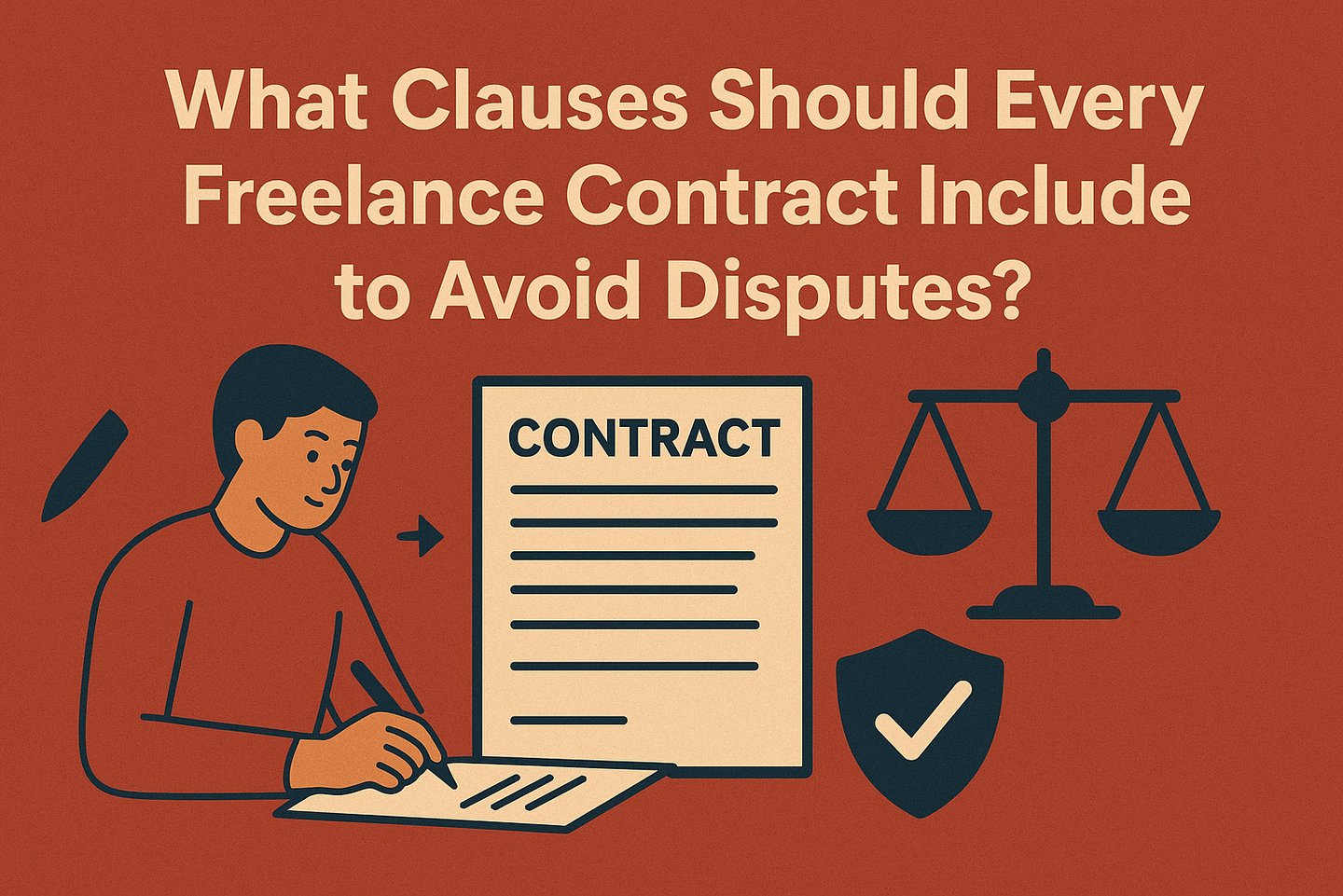What clauses should every freelance contract include to avoid disputes.
A good freelance contract helps avoid fights, keeps both sides safe, and makes everything clear so no one wastes time or money in arguments.
CORPORATE LAWS
Bhavna
9/14/20253 min read


Introduction
Freelance work counts on trust, translucent communication, and professionalism. Freelancers need contracts to clearly state the work, payments, and limitations, and also it is very essential to make sure that both the freelancer and the client understand each other's expectations, which is completely different from regular jobs where everything will already be set.
A good contract Is more than just a list of money and deadlines, but it also helps prevent future problems. By putting everything in writing, it reduces confusion, avoids disputes, and keeps the working relationship smooth and fair for both sides
Core Clauses Every Freelance Contract Should Include
1. Contact Information and Parties
Begin every contract by adding the complete legal names and details, like addresses and contacts, of both parties. This seems very plain but it is most essential requirement for legal enforceability and future communication
2. Scope of Work and Deliverables
Detailing the scope is critical for expectation management and dispute avoidance. This section must specify:
· Services to be provided (with detail: e.g., “website redesign of 10 pages”)
· Deliverables, with timelines and exact formats
· Limitations/exclusions (what’s not included)
· Deadlines and milestones (when each phase will be completed)
· Revision limits (the number of changes included in the quoted price)
A well-written scope prevents “scope creep”—the slow addition of tasks beyond the original agreement.
3.Pricing, Payment Terms, and Late Fees
State whether payment is per project, per milestone, hourly, or a hybrid. Include:
· The precise fee and currency
· Schedule for invoices and payments (upon completion, milestones, or regular intervals)
· Deposit requirements (commonly 25-50% upfront)
· Terms for late payments (interest or penalties)
· Payment method (bank transfer, online payment, etc.)
For hourly work, add clauses specifying minimum and maximum hours. Clarify terms for additional work outside scope.
4. Revision and Amendments Clauses
Clearly mention the number of revision rounds and what the terms are for extra revision, like, for example, three revisions are included; additional revisions are billed based on rounds. This limits unlimited, unpaid changes that often trigger disputes.
5. Intellectual Property and Copyright
Clearly mentioning who owns the created work and when rights transfer:
Copyright remains with the freelancer until payment process is completed, upon on which the freelancer transfer the rights to the client and Define use in portfolios or pre-existing materials
If the client expects exclusive rights, make sure this is clarified in order to prevent future misunderstandings.
6. Confidentiality Clause
Include a confidentiality or non-disclosure clause to protect essential information shared during the project. Specifically mention what is considered confidential information and how it has to be stored and handled, and the obligations and penalties in case of breaches.
7.Termination Clause
Mentioning an exit route by adding the circumstances for termination of contract, including:
· Notice period needed for termination or the cancellation fees, if applicable.
· Final payment terms for work completed to that point.
· Force majeure clauses stating unexpected events.
This clause prevents lock-in and covers scenarios like bankruptcy, illness, or dissatisfaction.
8. Dispute Resolution Clause
Mentioning a method for resolving the future disputes, like any alternative dispute method, before heading to the litigation process. This clause saves time and money and ensures efficient dispute resolution.
For example, mentioning that “if any dispute arises, it shall be resolved by the method of mediation.”
9.Acceptance Clause
Define when the client formally accepts deliverables (“Acceptance occurs upon written confirmation, or 7 days after submission if no feedback is given”). Acceptance triggers payment and marks project completion.
10. Force Majeure Clause
Make sure to address the unforeseen circumstances that might stop either party from carrying out obligations. Clearly mention what constitutes force majeure and the process for suspending or terminating the agreement.
11. Signatures and Dates
Most importantly after drafting a contract, it is necessary for it to be signed and dated by both parties for legal enforcement.
Additional considerations include:
· Non-Competition/Non-Solicitation Clauses: Avoid non-compete clauses unless necessary, as they may restrict freelancer livelihood and blur lines with employment law. Non-solicitation may be appropriate to prevent either party from poaching each other’s clients or staff.
· Portfolio Usage: Detail the rights of freelancers to showcase work in their portfolio, unless the client requires confidentiality.
· Complaint Procedures: Outline how complaints will be handled and timeframes for resolution.
· Expense Reimbursement: Include terms if freelancers need to make purchases on behalf of the client.
Drafting Tips to Avoid Disputes
· Use precise legal language and avoid ambiguity → Every contract should have clear, standard terms in order to avoid confusion about what it means. Avoid vague terms that tend to create misunderstanding.
· Record all negotiated amendments and attach addenda where required → if any changes are made after signing the contract, write them properly and then add them to the contract as an official attachment.
· Review local regulations for compliance, especially for cross-border work → it is very important to follow the laws of the country, especially when the freelancer and client stay in different places.
Conclusion
Freelance contracts are not just for the sake of formalities; they are powerful legal instruments to create clarity, set boundaries, and guarantee fairness in the relationship.
A good freelance contract makes work free from stress and safe by clearly mentioning the terms of the project, payment, and deadlines. This decreases the possibility of confusion, disagreements, or costly disputes, helping both the freelancer and the client feel secure and rewarded.
